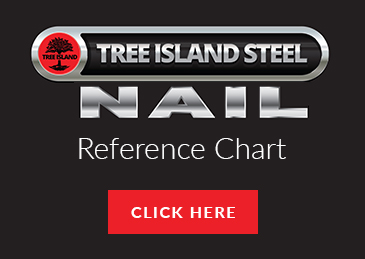Choosing the Right Nails for your Construction Project
Nail design has a big impact on functionality for various applications
Nails are some of the simplest fasteners you can buy, yet they still come in a huge variety of styles, sizes and finishes. Each type of nail has its pros and cons, and many are designed for very specific applications. In order to get the best results from your construction project, you must be careful to choose the right type of nail. Here is a brief overview of the key features of various types of nails, which should help you understand what kind of nails you need based on the requirements of your project.
Nail Heads
Nail heads come in a variety of sizes and shapes. Flat heads are probably the most common, and the larger the head the better the nail is in terms of striking surface and holding power. Flat head nails are ideal for many framing and construction projects, as long as you don’t mind having a visible nail head. If the nail head needs to be concealed, you would do better to choose countersunk or cupped nail heads, which can easily be concealed using putty or covered with drywall compound. Brads would be another option, as these nails have very small heads and are ideal for trim or finishing work.
Nail Shanks
The design of the nail shank you choose will have a huge effect on the nail’s holding power. Common nails with flat heads and smooth shanks are the most versatile, but when additional holding power is required, look for a nail with a textured or ringed shank. Ringed shanks are good for soft or medium density woods, while a barbed nail with a herringbone pattern or a nail with a screw shank is better for hard woods or other dense building materials. Special fluted or knurled shafts are required for working with masonry, as this type of shank can help create a strong hold while limiting risk of cracking.
Nail Points
The main types of nail points are diamond, long diamond, and blunt. Longer points are easier to hammer into harder woods or other materials. They are also useful for drywall. Blunt points are better for wood that is prone to splitting, but they are also more difficult to hammer in.
Nail Materials & Finishes
Steel, galvanized steel, copper, aluminum, and brass nails are all available, sometimes with additional finishes. Steel nails with a rust-proof finish or aluminum nails are ideal for applications where the nails will be exposed the elements, as these types of nails will not corrode, rust, or stain your materials. Other finishes, such as cement coating or vinyl coating, help with holding power.
If you need help selecting the right nails for your project, just ask the pros at Grove Construction Hardware.



































